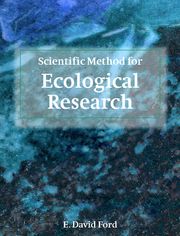Book contents
- Frontmatter
- Contents
- Preface
- Acknowledgements
- 1 Component processes of ecological research
- Introduction to Section I: Developing an analytical framework
- Introduction to Section II: Making a synthesis for scientific inference
- Introduction to Section III: Working in the research community
- 13 Scientific research as a social process
- 14 Values and standpoints and their influence on research
- Introduction to Section IV: Defining a methodology for ecological research
- Appendix: Suggestions for instructors
- References
- Glossary
- Author index
- Subject index
14 - Values and standpoints and their influence on research
Published online by Cambridge University Press: 08 January 2010
- Frontmatter
- Contents
- Preface
- Acknowledgements
- 1 Component processes of ecological research
- Introduction to Section I: Developing an analytical framework
- Introduction to Section II: Making a synthesis for scientific inference
- Introduction to Section III: Working in the research community
- 13 Scientific research as a social process
- 14 Values and standpoints and their influence on research
- Introduction to Section IV: Defining a methodology for ecological research
- Appendix: Suggestions for instructors
- References
- Glossary
- Author index
- Subject index
Summary
Summary
Our value systems help us to maintain consistency in our lives and lead us to adopting identifiable standpoints on particular issues. People with different value systems are likely to adopt different standpoints. The fourth and most fundamental stage of criticism applied to a piece of research is standpoint criticism – how it looks to people with different value systems. This is particularly important in defining the most basic assumptions made.
From their differing standpoints, scientists, resource managers, and policymakers can each limit the type of research that may be attempted and the management or policy to be implemented. Some scientists value scientific research for its own sake: some politicians value science in terms of its tangible benefit for solving identified problems in society. These contrasting values lead to different standpoints in the way that science should be organized and funded and particularly in the relative importance of peer review in the assessment of research programs and individual proposals.
Decisions about environmental policy and management of natural resources are made from particular standpoints. How scientific research can influence these decisions most effectively remains uncertain. Examples are given where scientific analysis was central to a particular resource management policy, and where it was excluded. Major changes became inevitable in both cases. In the first, society's demands changed the objectives of management – despite scientists concerns. In the second, environmental catastrophes occurred resulting in policy changes that some scientists had been urging.
The relationship between science and society is discussed from the perspective of ecology and how this relationship may influence what science is done and how it should be analyzed critically.
- Type
- Chapter
- Information
- Scientific Method for Ecological Research , pp. 431 - 464Publisher: Cambridge University PressPrint publication year: 2000



